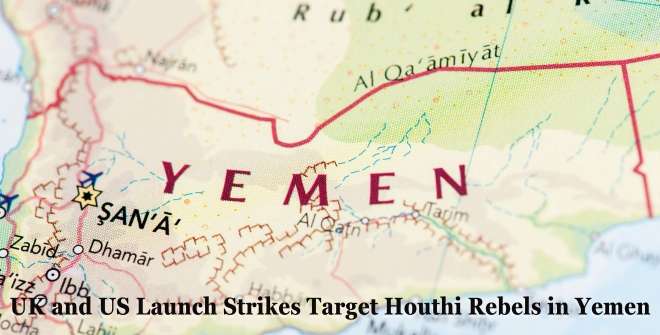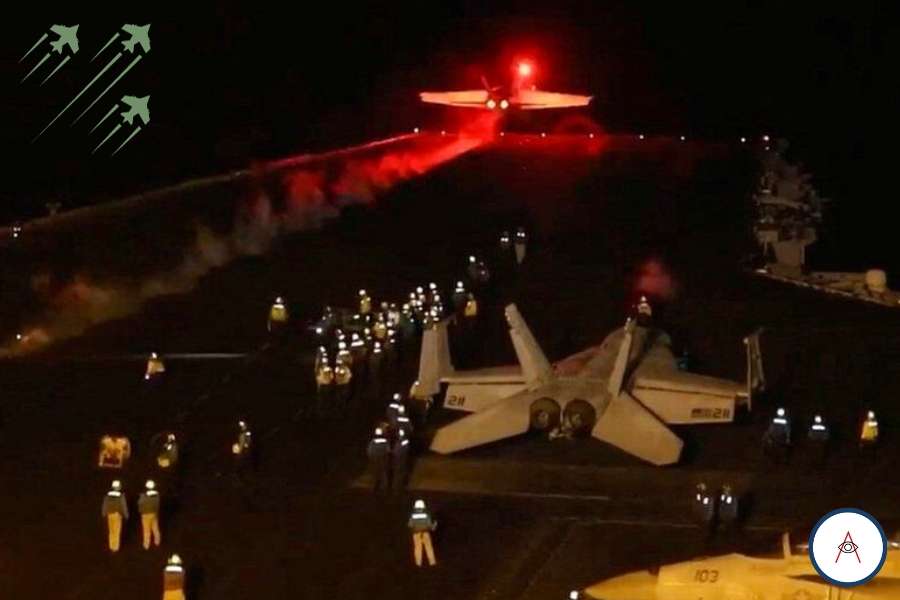Explore the latest news as the UK and US Launch Strikes Target Houthi Rebels in Yemen.
WASHINGTON/ADEN: The US and Britain have undertaken air and naval operations against Houthi military targets in Yemen in reaction to the movement’s attacks on ships in the Red Sea, Israel’s significant territorial development, and Hamas’s conflict in Gaza.
President Joe Biden issued a statement late on Thursday, threatening to take further action if needed, while eyewitnesses in Yemen verified the bombings to Reporters.
“These targeted strikes are a clear message that the United States and our partners will not tolerate attacks on our personnel or allow hostile elements to affect freedom of navigation,” Biden stated.
Table of Contents
The British Ministry of Defence released a statement stating, “It appears that the Houthis’ capacity to pose a threat to commercial shipping has been severely reduced.”
US Defence Secretary Lloyd Austin, who is in the hospital due to surgery problems, said in a statement that the strikes targeted Houthi assets including drones, ballistic and cruise missiles, coastal radar, and aerial surveillance.
A Houthi member confirmed the “raids” in Sanaa, as well as Saada and Damar, as well as the governorate of Hodeidah, calling it a “US-Zionist-British aggression.”
According to sources, the raids targeted a military base near Sana’a International Airport, a military base near Taiz International Airport, a Houthi naval station in Hodeida, and military outposts in Hajjah Governorate.
Though the United States has stated it has no intention of raising tensions, the current attacks represent one of the most dramatic displays of the expanding Middle East conflict between Israel and Hamas since it started in October.
Submarines, ships, and airplanes are carrying out these attacks, according to a US official who spoke under confidence.
According to the official, over twelve targets were hit, and the strikes weren’t just symbolic; they were intended to reduce the Houthis’ military power.
“The goal of these strikes was very clear from the beginning and the president, and that was to eliminate the Houthis’ ability to target maritime vessels, whether commercial or military,” according to another U.S. military official.
The Houthis, who rule a large portion of Yemen, have rejected calls from the UN and other international organizations to stop their drone and missile strikes on Red Sea maritime lanes and the UN.
If they don’t comply, the US has been threatened with consequences.
Attacks carried out in favor of Hamas, the Islamist Palestinian organization in charge of Gaza, are claimed by the Houthis.
Israel started a military offensive in Gaza after Hamas launched an attack on Israel on October 7, killing over 23,000 Palestinians, including 1,200 murdered and 240 kidnapped.
About 15% of all marine traffic worldwide is routed through Europe and Asia, and since late December, the Houthis have assaulted 27 ships, causing delays to international trade on this important route.
Attacks by the Houthis on 27 ships since late December have caused international trade on the primary route between Europe and Asia—roughly 15 percent of all shipping traffic worldwide—to be disrupted.
A large portion of Yemen was taken over by the Houthis during the civil war, and they have threatened to destroy any ships that are headed for Israel or Israeli ports.
Many of the targeted ships, though, are unrelated to Israel.
The Houthi leader declared on Thursday that the organization would defend itself in favor of any US strike.

Houthis attempted 27 attacks against ships
The Houthi rebels launched an anti-ship ballistic missile attack in the Gulf of Aden for the 27th time since November 19, according to the U.S. military.
On January 9, a significant Houthi offensive in the Red Sea followed nighttime bombings in Yemen, forcing US and British forces to bring down 21 Houthi drones and missiles.
According to President Biden, the Houthis specifically targeted American ships.
Republicans praised the measure as a delay, while some Democrats expressed objections about the possible long-term inclusion.
Supported by Australia, Bahrain, Canada, and the Netherlands, the attacks were carried out independently of the US-led defense force.



